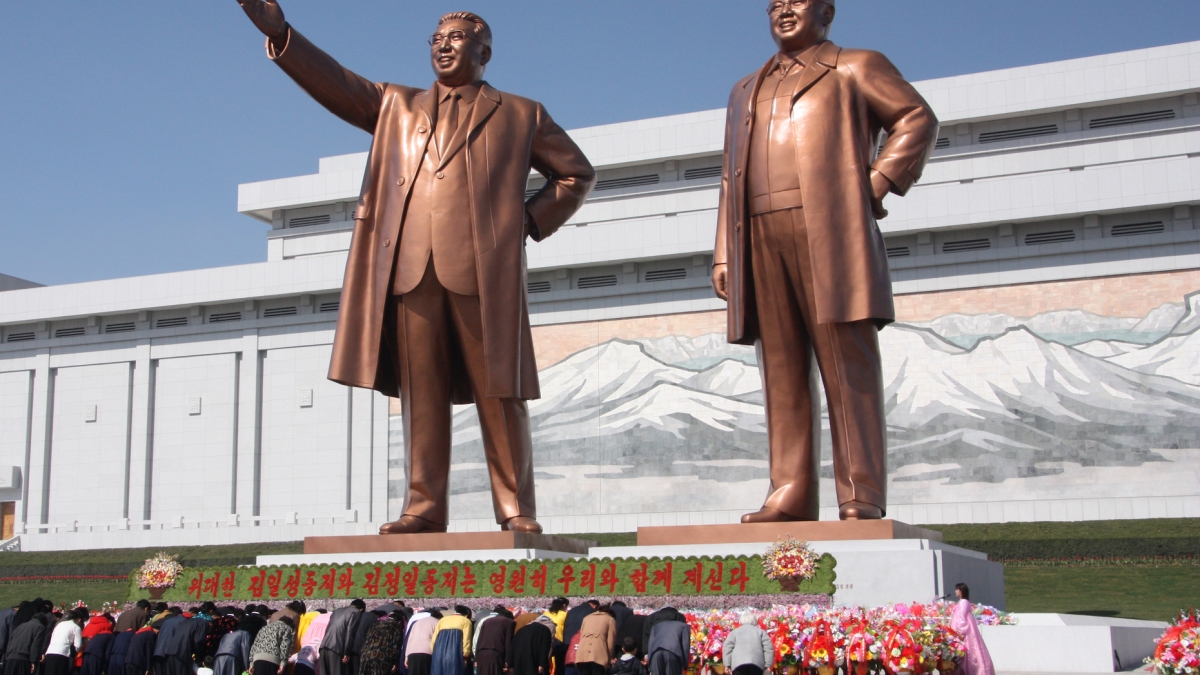McCain Institute expert has eyes on North Korea, not for the first time

Kim Jong Un has not been seen in public for several weeks, leading to widespread speculation that he is either in hiding due to COVID-19, recuperating from heart surgery, incapacitated in some way or possibly dead.
Rumors of the North Korean leader’s demise began when a Seoul-based website reported that he was recovering from an April 12 heart surgery.
North Korea has operated under a veil of isolation and secrecy ever since the Kim dynasty took control in 1948, so the intelligence community at large remains mystified on Kim’s whereabouts or if, in fact, he’s still alive.
Kim’s sudden disappearance leads to some very hard questions: Who will take over for the Communist leader if he died? Will it lead to serious military action or a refugee crisis? What will it mean for future relations with the United States and the rest of the world?
Nicholas J. Rasmussen, senior director for National Security and Counterterrorism Programs at the McCain Institute for International Leadership and distinguished professor of practice with the Sandra Day O’Connor College of Law, is qualified to answer some of those questions.
He has a long history with North Korea, starting even before his time as top assistant to lead negotiator Ambassador Robert Gallucci during the June 1994 nuclear crisis and nearly went to war.
Rasmussen, who works in Washington, D.C., spoke to ASU Now about what this might mean for future U.S. and world relations with North Korea.
Nicholas J. Rasmussen
Question: Why is our intelligence on Kim Jong Un’s whereabouts so fuzzy, and what is your gut feeling about his health condition?
Answer: Intelligence information on North Korea, and particularly on leadership dynamics and developments in Pyongyang, has always been very difficult to come by for our U.S. intelligence agencies. The Democratic People’s Republic of Korea (DPRK) is among the very “hardest” of the hard targets that our intelligence community focuses on. We are also hindered by the fact that other countries that likely have good intelligence on the situation in North Korea, like China, might not be inclined to share that information with us.
That said, President Trump’s relatively guarded public comments in recent days suggest to me that he is being briefed regularly with the best analysis/assessment that our intelligence agencies can provide. I also suspect there are specific indicators that the Central Intelligence Agency and our intelligence agencies would expect to see if there were a potential leadership transition in the offing, or if there were a sense of crisis at senior levels in North Korea.
So my “gut” feeling is that there is some substance to the reporting about Kim Jong Un’s health and that if those reports were completely without foundation, the DPRK regime would have found a way to refute them and demonstrate in a public way that Kim Jong Un is healthy and playing his usual leadership role. The fact that this hasn’t happened to me a telling indicator. But the bottom line is that the DPRK has historically been able to keep a very, very tight grip on information about developments inside North Korea, and we are thus left with many more questions than answers.
Q: If it is discovered that Kim Jong Un is in a vegetative state or dead, who will most likely take over for him?
A: That, of course, is the critical question to which we all want answers. The challenge is that this is an entirely unprecedented situation, in that previous DPRK leadership transitions have largely been preordained through a dynastic process of family succession. Even the seasoned North Korea experts in whom I place the most trust cannot give a high confidence prediction about how succession will play out in this situation, particularly if Kim Jong Un’s health declines rapidly and he has very little chance to shape the succession process.
There is the possibility that Kim’s sister, Kim Yo Jong, could ascend to the leadership role, as many have predicted. But as highly regarded North Korea expert Sue Mi Terry pointed out in a recent Washington Post op-ed, there are questions about whether critical North Korean elites in the party and the military would willingly acquiesce to the idea of a woman taking the leadership role, even a woman from the Kim leadership bloodline. And if that happened, Dr. Terry argued that either another senior party figure would have to emerge as leader or we would have to await the results of a more protracted internal struggle for control. So while Kim Yo Jong might be the most likely answer, that result is by no means guaranteed.
Q: Some news reports have speculated that Kim Jong Un’s death might require military action and create a refugee crisis. Why is that?
A: A leadership transition in North Korea by its very nature will lead to uncertainty and concern about increased instability. For example, if there is some kind of internal leadership struggle within the DPRK in the wake of Kim Jong Un’s death, the United States and our allies in northeast Asia would have to be on heightened alert for any sign that one faction or another in Pyongyang might look to provoke some sort of military crisis as a means of unifying the country. Questions about who has decision-making authority in North Korea, particularly over military issues and potential use of the DPRK’s nuclear arsenal, could also trigger a military crisis between the DPRK and the U.S. The framework of nuclear deterrence that right now seems to exist in northeast Asia might well be undermined if we were all of a sudden blind to leadership dynamics in Pyongyang and left to guess about North Korean intentions. It’s this kind of uncertainty that could lead to miscalculation and ultimately to a conflict that neither side wants.
Q: Some say this is an opportune time to reach out to North Korea and deescalate a hostile situation. But others have stated it could possibly get worse before it gets better. What do you think will happen if Kim Jong Un is no longer in power?
A: Given all of the uncertainty about leadership transition in North Korea, predictions are not really worth that much in my view. However it plays out, though, U.S. strategy and policy should look to rely on certain fundamentals. For example, China and the U.S. share a broad interest in there not being a military conflict between the U.S. and North Korea. Washington and Beijing must work harder than ever to communicate with each other on the question of North Korea so we can determine whether any common ground exists about the future of the Korean peninsula, beyond the simple idea that war is bad for everyone.
The question of how much influence China has over North Korean decision-making always arises in moments of crisis with North Korea. From my perspective, answering that question definitively is impossible. But answering that question from a relative perspective is actually pretty easy. China has more insight into North Korea and more ability to shape events there than any other actor engaged in the region, so it’s therefore essential that we work constructively with Beijing to manage any transition period.
It’s also essential in my mind that the Trump administration take even greater care than ever to be seen to be consulting closely with our allies in Seoul and Tokyo. That diplomatic outreach sends an important message of strength and unity to any future North Korean leader and would also prove reassuring to publics in Japan and the Republic of Korea. Despite tensions on issues related to host country support for U.S. forces based in Japan and Korea, it is more important than ever to demonstrate that the alliance relationship is strong and reliable and not subject to being undermined by North Korean military provocations.
Top photo: The statues of Kim Il Sung (left) and Kim Jong Un on Mansu Hill in Pyongyang, North Korea. Photo by Wikimedia Commons/J.A. de Roo
More Law, journalism and politics

'Politics Beyond the Aisle' series to explore the stories of public officials
In an effort to build a stronger connection between students and political and civic leaders, Arizona State University’s School of Politics and Global Studies hosted the first event of its new series…

ASU committed to advancing free speech
A core pillar of democracy and our concept as a nation has always been freedom — that includes freedom of speech. But what does that really mean?Higher education doesn’t have an agenda to curate a…

ASU experts share insights on gender equality across the globe
International Women’s Day has its roots in the American labor movement. In 1908, 15,000 women in New York City marched to protest against dangerous working conditions, better pay and the right to…


